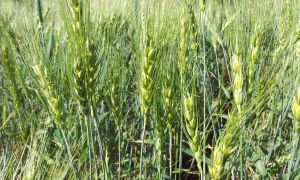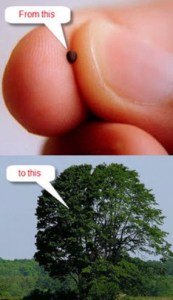
Lolium temulentum, known as darnel, poison darnel, darnel ryegrass, cockle or tares, BioNET-EAFRINET.
Click here to access today’s Sunday Mass Readings.
[Jesus said], “The kingdom of heaven may be likened to a man who sowed good seed in his field. While everyone was asleep his enemy came and sowed weeds all through the wheat, and then went off.” Matthew 13:24-25.
Click on words highlighted in red for further information.
Last week’s reflection compared us today to those first listeners to Jesus all those years ago. They would have understood the Master much more readily than we can, far from things agricultural or even natural. Today’s gospel returns us to the fields, again with a seed-sowing motif but this time with a deliberate twist. Here we have an “enemy”, clearly Satan, sowing destructive weeds among the good seeds in order to destroy them. Now our translation today states simply “weeds”. If you turn to the original Greek, the word translated as weeds is ζιζάνια, zizania, which has a more specific meaning than the generic “weeds”. It means “tares”. OK, hands up those who know what “tares” are. Well, they are pictured above. And what does it resemble? Take a look:

Young wheat, Solapur, Maharashtra, India.
Now, those first people to hear this parable would instantly understand what Jesus was suggesting. Those of us dealing with suburban garden weeds, or, like me, have not a clue about weeds or gardens, almost certainly would not. If you compare the two photos above, it is very hard to tell which is the weed and which is the wholesome wheat. Now the parable springs into life! The enemy’s seedlings must look like any one of us! Many movies and crime stories have used that “cover” for the villain. How many times have we heard on the 6 o’clock news that someone just arrested for some horrible crime just looked and apparently acted like any one of us! Jesus knew exactly which images to use in his stories because they would be instantly understood, even by the very highest in society. For us today, not so easily. For example, the Duke of Burgundy, one of Europe’s highest ranking sovereigns in the 15th century, in making peace between France and England in Shakespeare’s play Henry V, lists “darnel, hemlock and rank fumitory, docks, rough thistles, kecksies, burs” (Henry V, Act 5 Scene 2), growing untroubled in France’s fertile fields as battle had raged, all of these being destructive weeds that even he knew all about! And Shakespeare’s audience would know exactly what he meant. But Jesus has the farmer say to leave these destructive weeds alone, for they will dealt with at harvest time when they will be separately collected and burned. Again the pre-19th century audience would know why:
 The green plant on top is darnel, tares, in bloom. Underneath is a variety of wheat. Bible Bits.
The green plant on top is darnel, tares, in bloom. Underneath is a variety of wheat. Bible Bits.
Now it is so much easier to tell the wheat from the chaff! The harvest, of course, is the Last Judgement. Now, again, does this mean that the evil person is automatically condemned to the fire? No possible forgiveness of change? Well in this parable, it seems to be so. A darnel is a darnel forever. So it is therefore unwise to take one parable in isolation and make of it whatever you will. What happens if you compare this parable to that of the Prodigal Son? Then what? He “came to his senses”. Can a humble darnel do that? Well, the true Christian has to say “yes” and we pray for that moment daily. Jesus said elsewhere that we are of more value than many sparrows in Matthew 10:26-33, and certainly more than wretched darnel! But, of course, it is up to us which pathway to choose, which law to obey, which person to be.
The longer gospel today mentions parables, commenting on how Jesus used them constantly. This was to fulfill the teaching set out in Psalm 78:
My people, hear my teaching;
listen to the words of my mouth.
2 I will open my mouth with a parable;
I will utter hidden things, things from of old—
3 things we have heard and known,
things our ancestors have told us.
Jesus used images familiar to his listeners in such a way that the story pointed to a much deeper meaning. We do that today. Consider, for example, Little Red Riding Hood. You can tell your children every day for a year that you must not speak to strangers. They may hear it or not. Tell them the story of Little Red Riding Hood, with scary gestures and voices, and it will never be forgotten (I remember it now near age 80!). Parables add a dynamic to your message which makes them memorable, and the interest generated by them means, hopefully, that the listener will be impressed and learn and act on the message. Today’s gospel, for example, tells us to try and evaluate the people we encounter, because they may not be the type we want to be with. That is difficult (as seen from today’s parable), but we should at least try. I know people who are hopeless at judging character, and others who are spot on. All we can do is cling to the Lord daily, knowing he will help us back up if we fall, if we ask him. Today’s longer gospel also includes the image of the mustard seed, which is all we need for us to realise that we can achieve greater things for the Lord…

PLEASE FORWARD THIS WEBPAGE TO THOSE YOU THINK WOULD APPRECIATE IT.
THANK YOU.
Reflections on next Sunday’s Mass Readings will be posted on Wednesday.
Please send your reflections to: RogerJohn@aol.com
© SundayMassReadings.com

